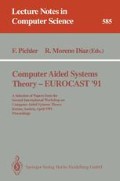Abstract
Cast.fsm is a method bank for the treatment of finite state machines. In this paper we report on the practical application of Cast.fsm to the controller synthesis as part of the VLSI synthesis. We present experimental results for the algebraic decomposition and the shift register realization of the MCNC benchmark FSMs and controllers of digital circuits. Requirements for further developments with respect to industrial applications are discussed for the two specific methods used in this work as well as for CAST method banks in general.
Preview
Unable to display preview. Download preview PDF.
References
P. Ashar, S. Devadas, and A.R. Newton. A unified approach to the decomposition and redecomposition of sequential machines. In Proc. of the 27th Design Automation Conference, 1990.
R. K. Brayton, G. D. Hachtel, C. T. McMullen, and A.L. Sangiovanni-Vincentelli. Logic Minimization Algorithms for VLSI Synthesis. Kluwer Academic Publishers, Dordrecht, 1984.
Karl Heinz Böhling. Zur Theorie der Schieberegister-Realisierungen von Schaltwerken. Technical Report 1, Gesellschaft für Mathematik und Datenverarbeitung, Bonn, 1968.
R. Brayton, R. Rudell, A. Wang, and A. Sangiovanni-Vincentelli. MIS: A multiple-level logic optimization system. IEEE Trans. on Computer-Aided Design, CAD-6(6), November 1987.
Srinivas Devadas. General decomposition of sequential machines: Relationship to state assignment. In Proc. of the 26th Design Automation Conference, 1989.
Giovanni De Micheli, Robert K. Brayton, and Alberto Sangiovanni-Vincentelli. Optimal state assignment for finite state machines. IEEE Trans. on Computer-Aided Design, CAD-4(3):269–285, July 1985.
EDIF Steering Committee. EDIF 2 0 0 — Electronic Design Interchange Format, Version 2 0 0. Electronic Industries Association, 20001 Eye Street, NW, Washington DC, 20006, May 1987.
M. Geiger. Requirements for systems theory software applied to VLSI-design. In Robert Trappl, editor, Proc. of the Tenth European Meeting on Cybernetics and Systems Research, Singapore, 1990. World Scientific Publishing Co.
Martin Geiger. Finite State Machine Methods Applied to VLSI Synthesis. PhD thesis, Institute of Systems Sciences, Johannes Kepler University Linz, 1991.
Martin Geiger and Thomas Müller-Wipperfürth. FSM decomposition revisited: Algebraic structure theory applied to MCNC benchmark FSMs. In Proc. of the 28th Design Automation Conference, 1991.
J. Hartmanis and R. E. Stearns. Algebraic Structure Theory of Sequential Machines. Prentice Hall, Englewood Cliffs, 1966.
Bob Lisanke. Logic synthesis and optimization benchmarks. Technical report, MCNC, Research Triangle Park, North Carolina, December 1988. (Documentation for the benchmark examples used in conjunction with the 1989 MCNC International Workshop on Logic Synthesis).
Bill Lin and A. Richard Newton. Synthesis of multiple-level logic from symbolic high-level description languages. In Proc. of the VLSI 89 Conference, Munich, 1989.
S. März, K. Buchenrieder, P. Duzy, R. Kumar, and T. Wecker. CALLAS — a system for automatic synthesis of digital circuits from algorithmic behavioral descriptions. In Proc. of the Conference EUROASIC 89, Grenoble, 1989.
Rudolf Mittelmann. CAST:FSM user's guide. Technical report, Institut für Systemwissenschaften, Johannes Kepler Universität Linz, July 1989.
Thomas Müller-Wipperfürth. An efficient implementation of the FSM lattice computation and decomposition using CommonLisp/Flavors/C. Technical report, Institute of Systems Sciences, University Linz, 1991.
Thomas Müller-Wipperfürth and Martin Geiger. Algebraic decomposition of MCNC benchmark FSMs for logic synthesis. In Proc. of the Conference EUROASIC 91, Paris, 1991.
F. Pichler. CAST — computer aided systems theory: A framework for interactive method banks. In Robert Trappl, editor, Proceedings of the Ninth European Meeting on Cybernetics and Systems Research, pages 731–736, Dordrecht, 1988. Kluwer Academic Publishers.
F. Pichler and H. Prähofer. CAST.FSM computer aided systems theory: Finite state machines. In R. Trappl, editor, Cybernetics and Systems 88, pages 737–742, Dordrecht, 1988. Kluwer Academic Publishers.
F. Pichler and H. Schwärtzel. CAST Computerunterstützte Systemtheorie. Springer Verlag, Berlin, 1990.
G. Rietsche and Neher. M. Castor: State assignment in a finite state machine synthesis system. In Proc. of the IFIP Working Conference on Logic and Architecture Synthesis, Paris, 1990.
Peter H. Starke. Abstract Automata. North-Holland Publishing Company, Amsterdam, 1972.
IEEE Standard VHDL Language Reference Manual, IEEE Std. 1076–1987.
Author information
Authors and Affiliations
Editor information
Rights and permissions
Copyright information
© 1992 Springer-Verlag Berlin Heidelberg
About this paper
Cite this paper
Geiger, M. (1992). CAST.FSM applied to VLSI synthesis: Experimental results and requirements for industrial use. In: Pichler, F., Díaz, R.M. (eds) Computer Aided Systems Theory — EUROCAST '91. EUROCAST 1991. Lecture Notes in Computer Science, vol 585. Springer, Berlin, Heidelberg. https://doi.org/10.1007/BFb0021033
Download citation
DOI: https://doi.org/10.1007/BFb0021033
Published:
Publisher Name: Springer, Berlin, Heidelberg
Print ISBN: 978-3-540-55354-0
Online ISBN: 978-3-540-47034-2
eBook Packages: Springer Book Archive

